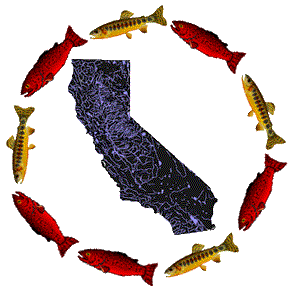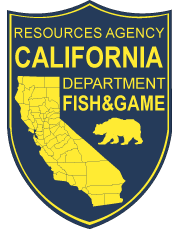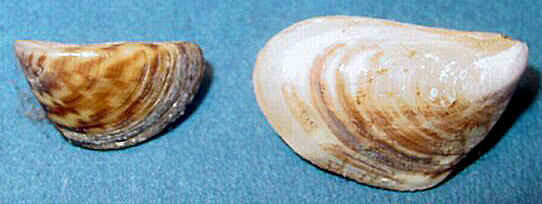CSPA |
| Your 501(c)(3) tax deductible cash donations are desperately needed if the fight for our fisheries is to continue. Read how you can donate! |

 More News
More News
![]()
 California Reminds Boaters & Water Users: Don’t Move A Mussel: New Invasive Mussel Guidebook Available Online
California Reminds Boaters & Water Users: Don’t Move A Mussel: New Invasive Mussel Guidebook Available Online
SACRAMENTO, Calif. - A state multi-agency taskforce today unveiled a guidebook to help water managers and recreationalists take part in the fight against invasive Quagga and Zebra mussels. The “Invasive Mussel Guidebook” outlines how aquatic mollusks can devastate waterways and why local governments and water users should encourage all Californians not to move a mussel.
 |
Quagga and zebra mussels |
The taskforce - composed of California’s Department of Fish and Game, Department of Water Resources, Department of Parks and Recreation, Department of Boating and Waterways and Department of Food and Agriculture - is working to advance understanding about these mussels and their potential ecological and economic impacts. However, it is local officials and residents who must take critical steps to address this important issue.
Quagga and Zebra mussels were first detected in the Great Lakes in the late 1980s, resulting in hundreds of millions of dollars in damage to water delivery systems. They were first detected in the Colorado River system in January 2007 and were later found in San Diego and Riverside counties by state and local water agencies. Zebra mussels were discovered in San Justo Reservoir in San Benito County in January 2008.
The “Invasive Mussel Guidebook” provides strategies for local involvement in the Quagga and Zebra mussel response. Although the mussels are not established in all California lakes and reservoirs, most areas of the state are vulnerable to future transport and contamination by the species. Because the mussels are primarily transported by watercraft, water managers are urged to develop policies to ensure that the invasive mollusks are not moved via boats or ballast water.
Both species of mussel are non-native aquatic mollusks that wreak havoc on the environment by disrupting the natural food chain and releasing toxins that affect other aquatic species. Although they range in size from microscopic to the size of a fingernail, they are prolific and attach themselves to hard and soft surfaces.
In addition to devastating the natural environment, Quagga and Zebra mussels pose a dramatic economic threat to California. The mussels can colonize on hulls, engines and steering components of boats, other recreational equipment, and can damage boat motors and restrict cooling. The invasive species also attach to aquatic plants, and submerged sediment and surfaces such as piers, pilings, water intakes, and fish screens. In doing this, water intake structures can be clogged, hampering the flow of water. The mussels frequently settle in massive colonies that can block water intake and threaten municipal water supply, agricultural irrigation and power plant operations.
Zebra mussels inhabit water depths from four to 180 feet, while Quagga can reach depths more than 400 feet. Both mollusks can attach to and damage boat trailers, cooling systems, boat hulls and steering equipment. Mussels attached to watercraft or trailers can be transported and spread to other water bodies. Water in boat engines, bilges, live wells and buckets can carry mussel larvae (called veligers) to other water bodies as well.
To help prevent the spread of the mussels, boaters should inspect all exposed surfaces, wash boat hulls thoroughly, remove all plants from boat and trailer, drain all water, including lower outboard units, clean and dry livewells and bait buckets and dispose baitfish in the trash.
Most importantly, watercraft should be dried for at least five days between launches in different fresh bodies of water. These steps are designed to thwart spread of the invasive mussels, safeguard boats and preserve high-quality fisheries.
The taskforce is currently working to determine the extent of the Quagga and Zebra mussel threat and to educate watercraft users and water managers about what they can do to help. As part of the public education effort, the state has facilitated nearly a dozen Quagga/Zebra inspection and decontamination trainings for more than 300 individuals in San Diego, Redding, Fresno, Stockton, Monterey, Los Alamitos, Onatrio, Lake County, Sacramento and Yountville.
To date, the taskforce has distributed more than 1.75 million information cards and 1.2 million letters to registered boaters and other water users around the state about the Quagga and Zebra mussel threat. The California Department of Food and Agriculture has inspected nearly 180,000 watercraft at its 16 Border Protection Stations since 2007. Inspections continue daily.
To access the “Invasive Mussel Guidebook” in its entirety, please visit www.resources.ca.gov/quagga.
A public toll-free hotline - 1-866-440-9530 - has also been established for information about destructive Quagga and Zebra mussels. The toll-free number is available Monday through Friday, 8 a.m. to 5 p.m.
For more information about the Quagga/Zebra mussel response, please visit www.dfg.ca.gov/invasives/quaggamussel.
Contact:
Alexia Retallack, 916-322-8944
Jordan Traverso, 916-654-9937